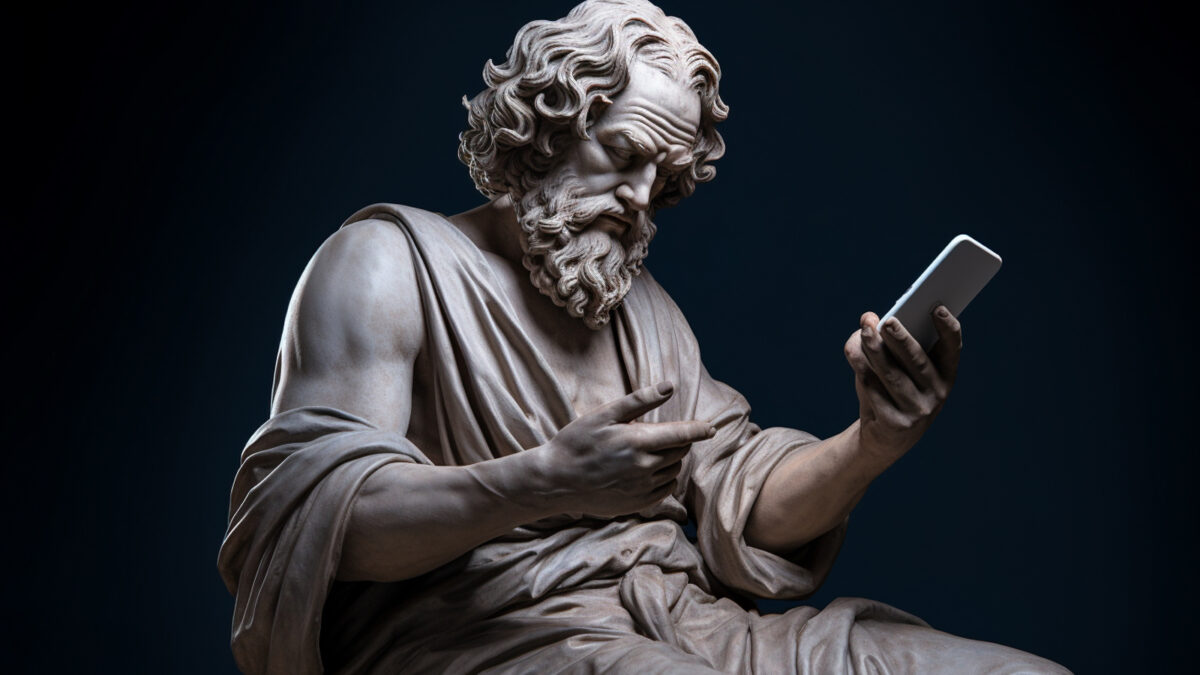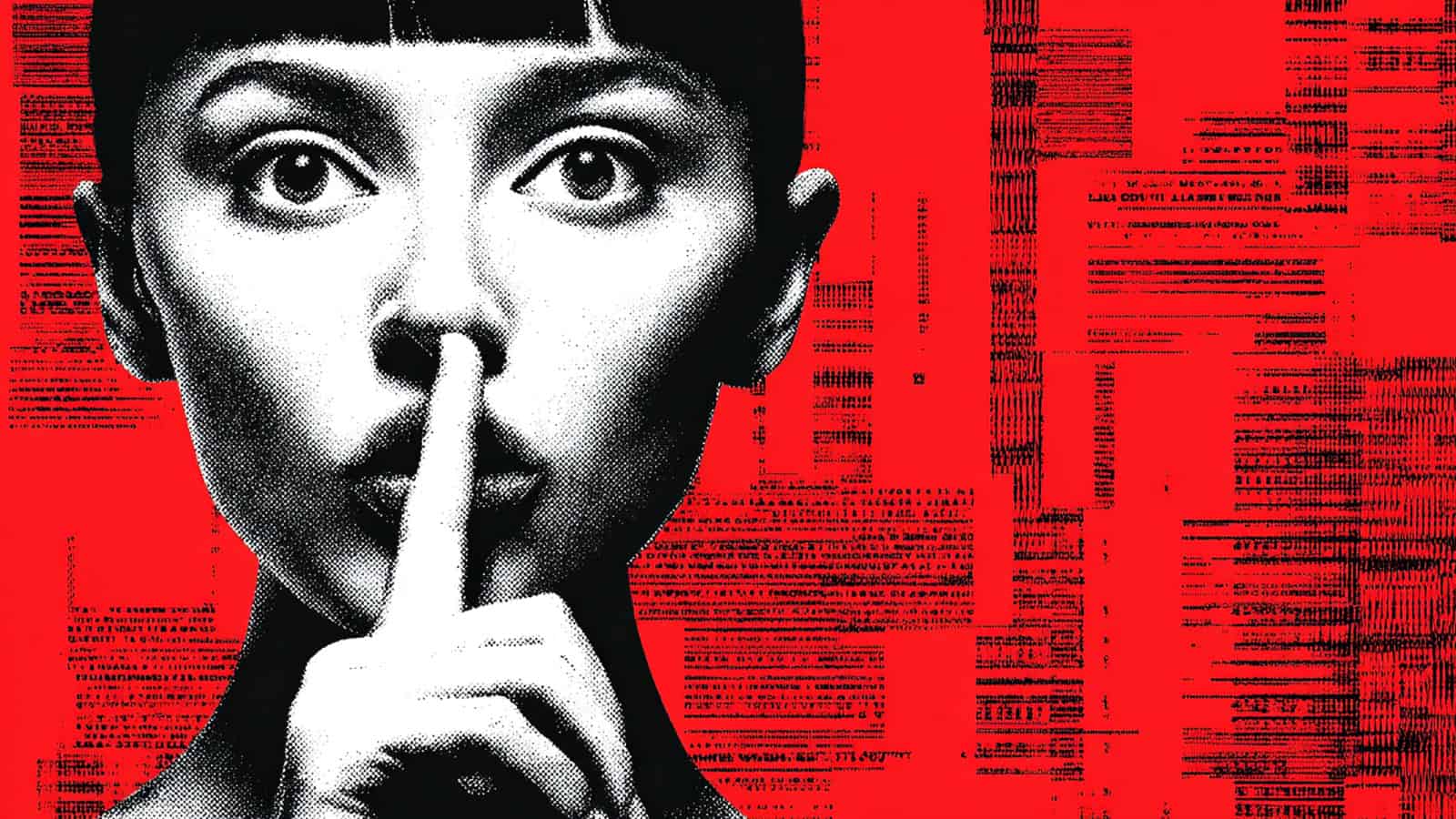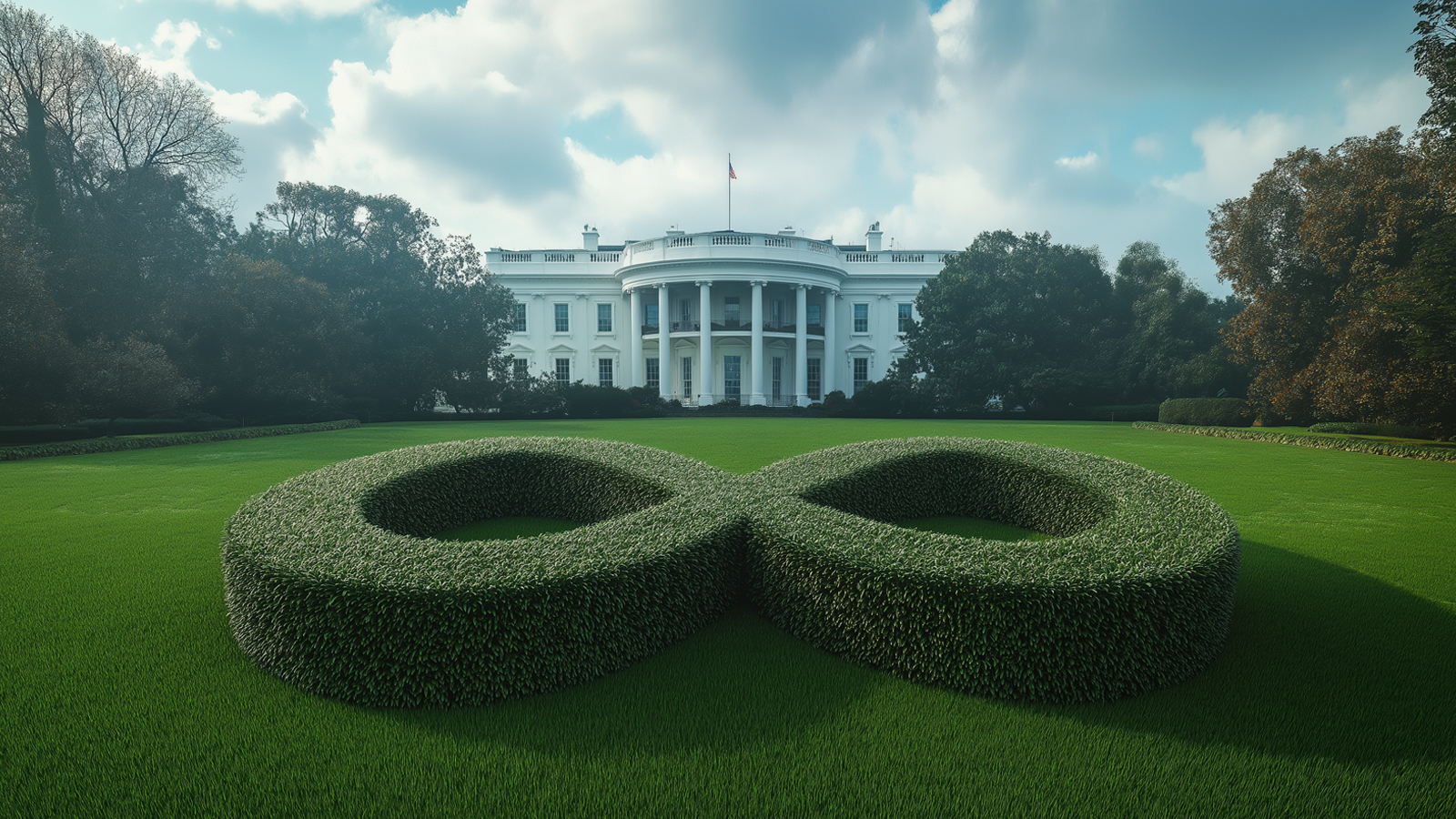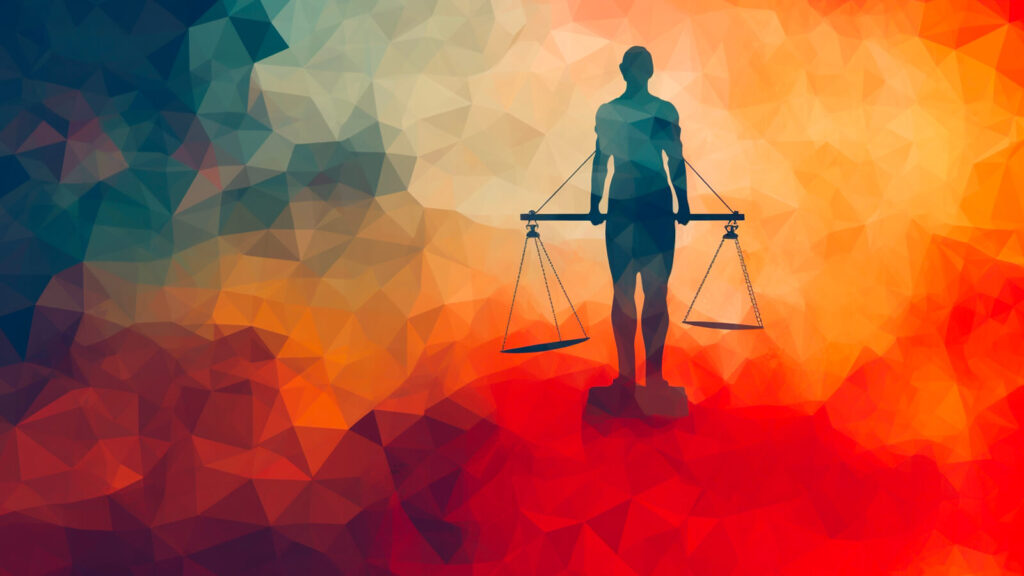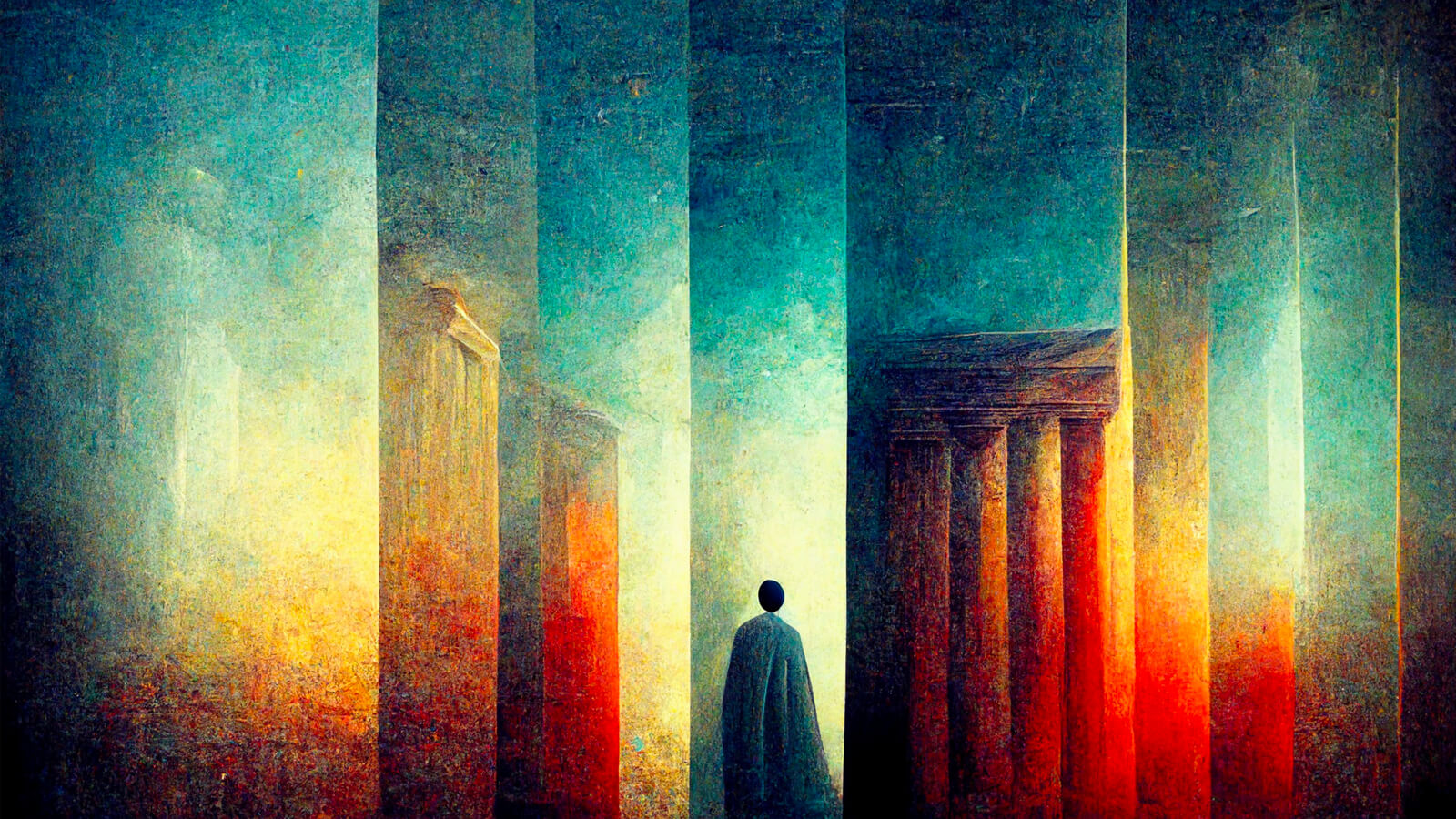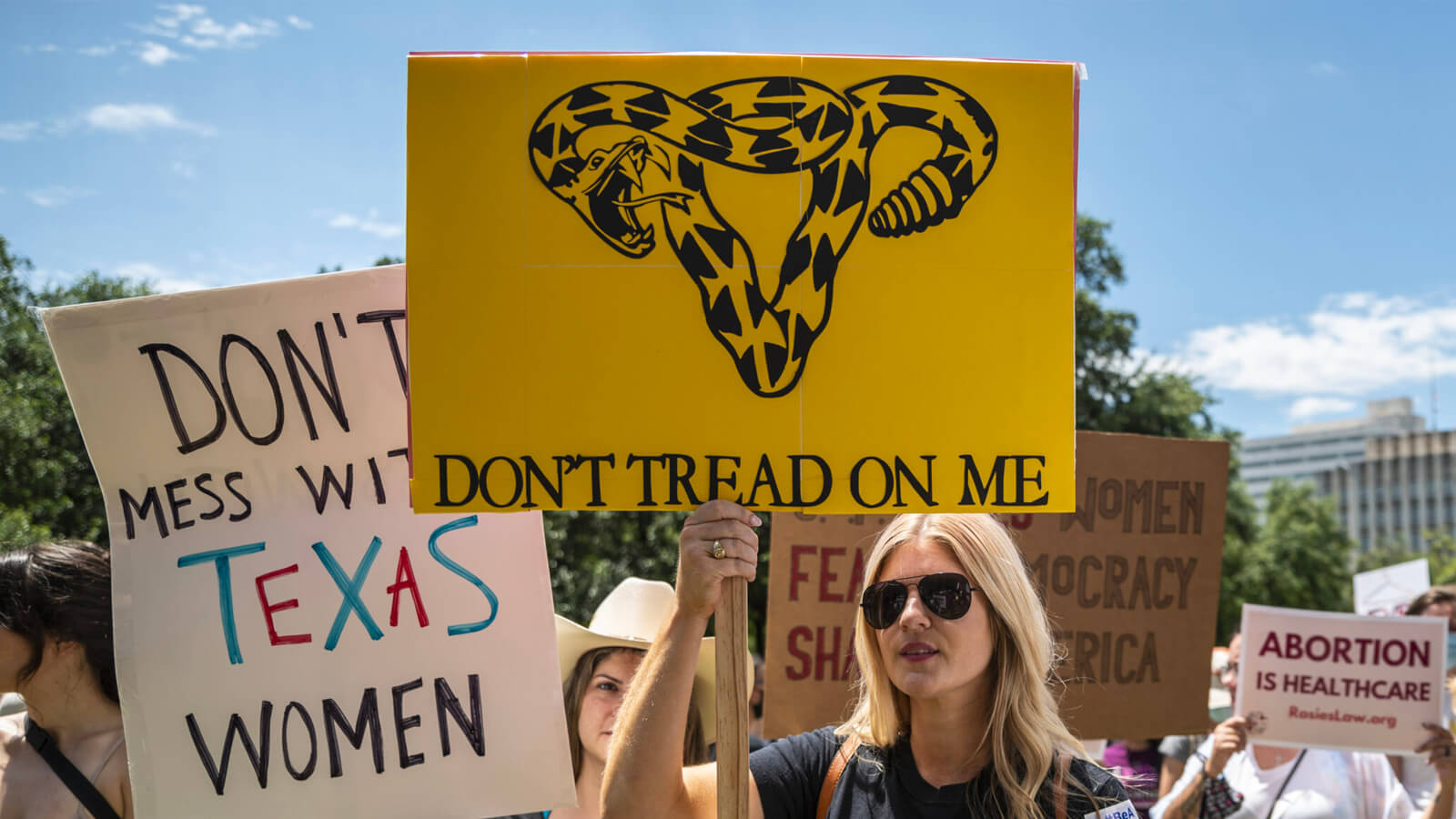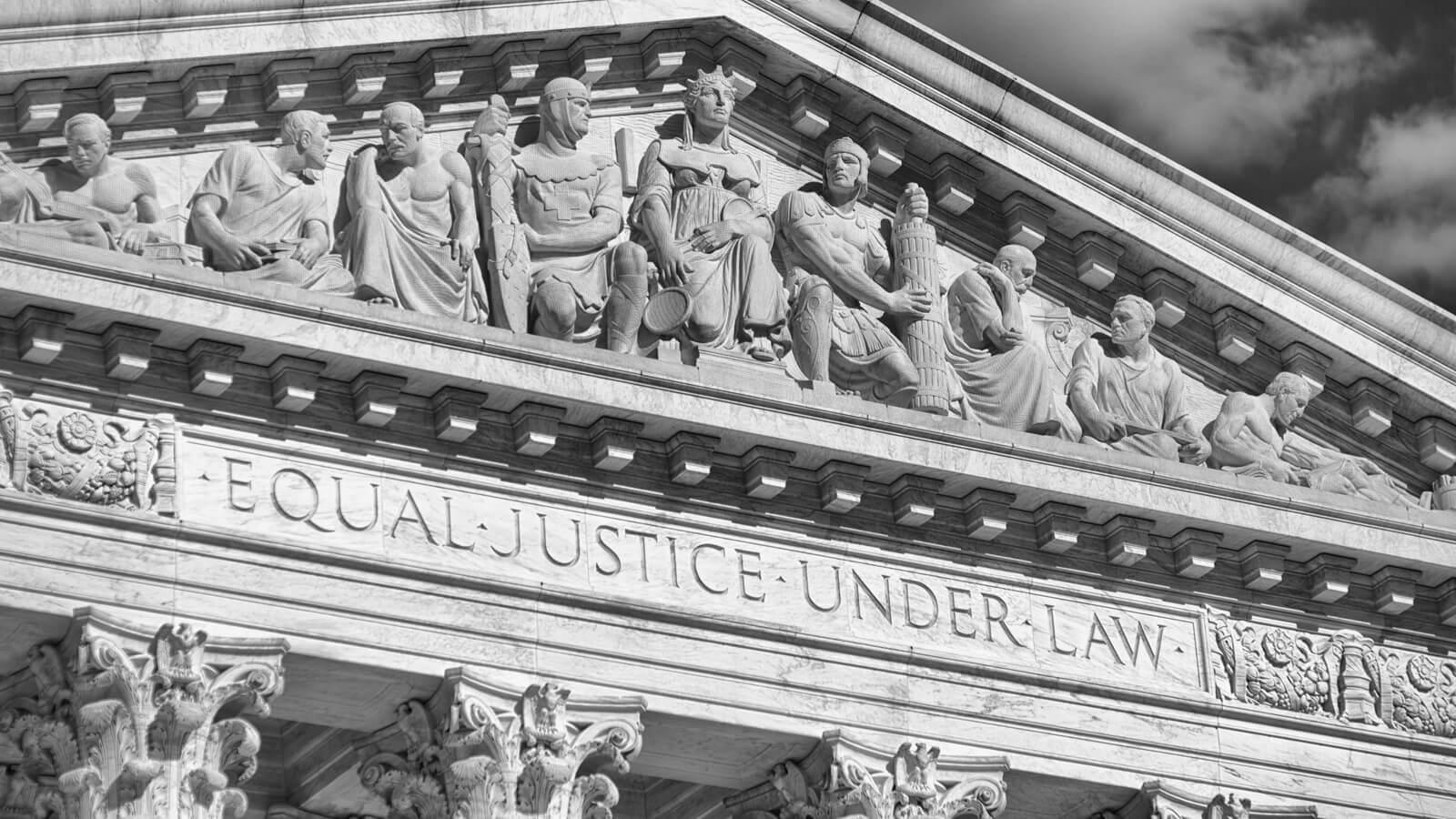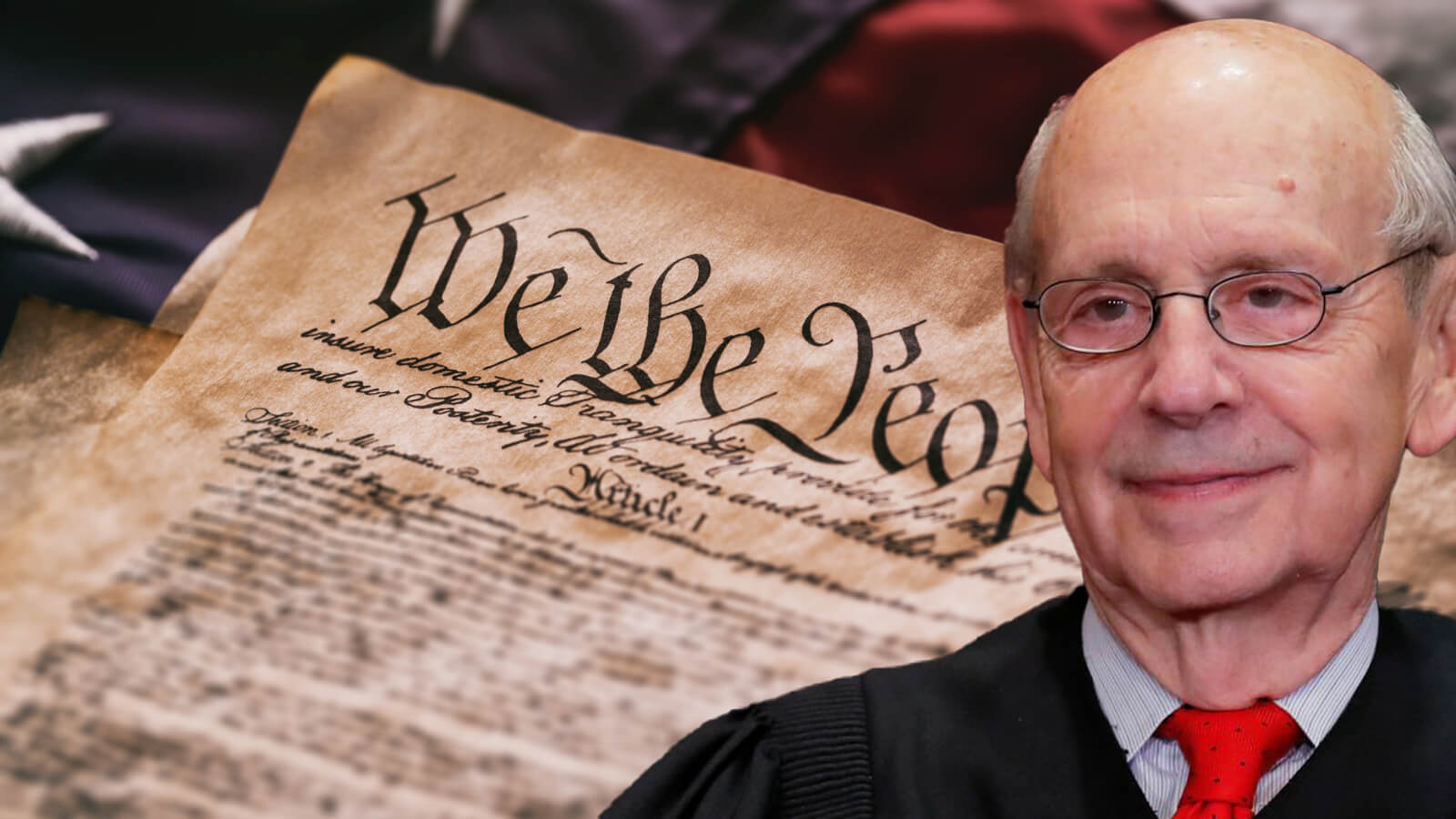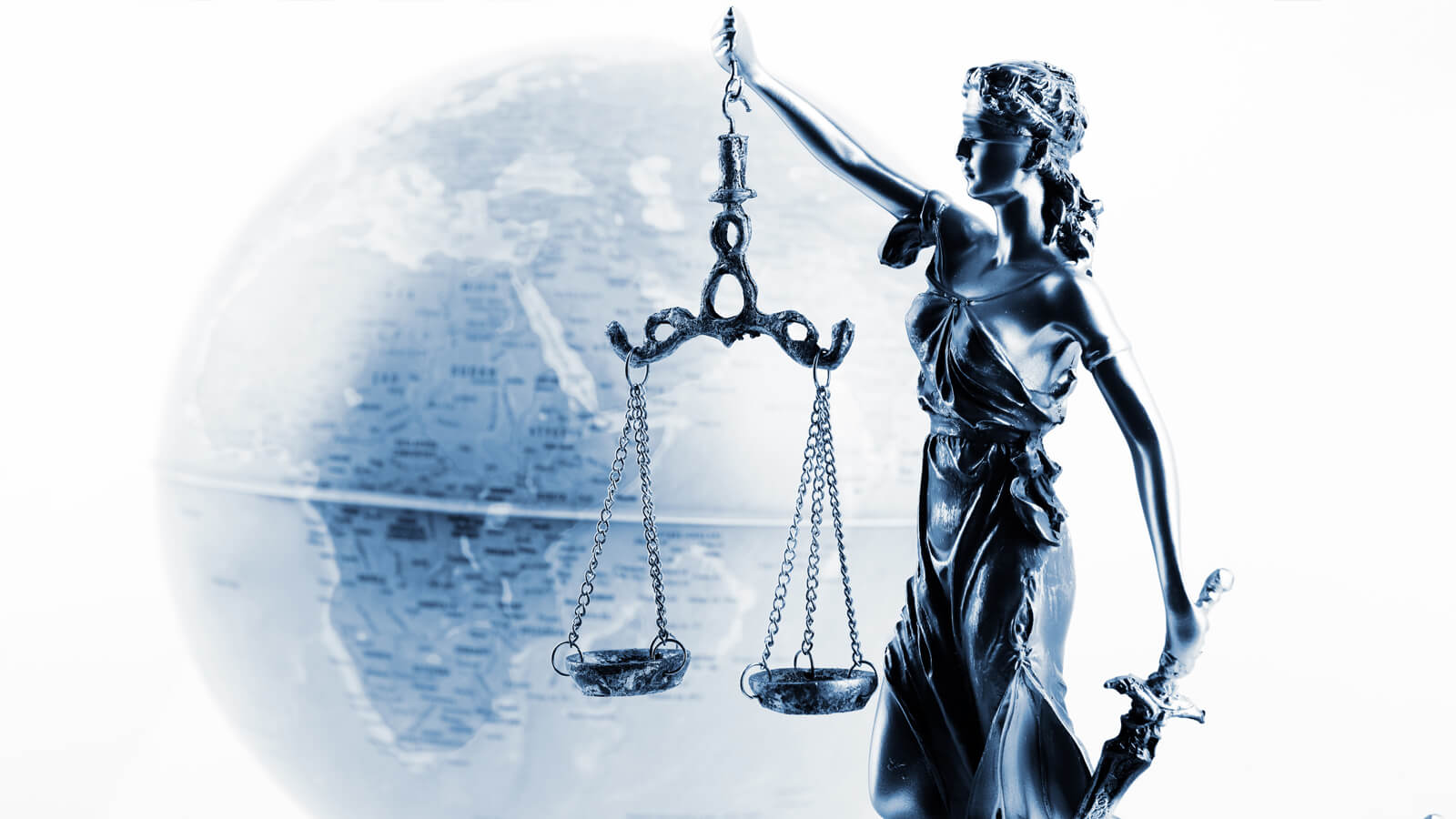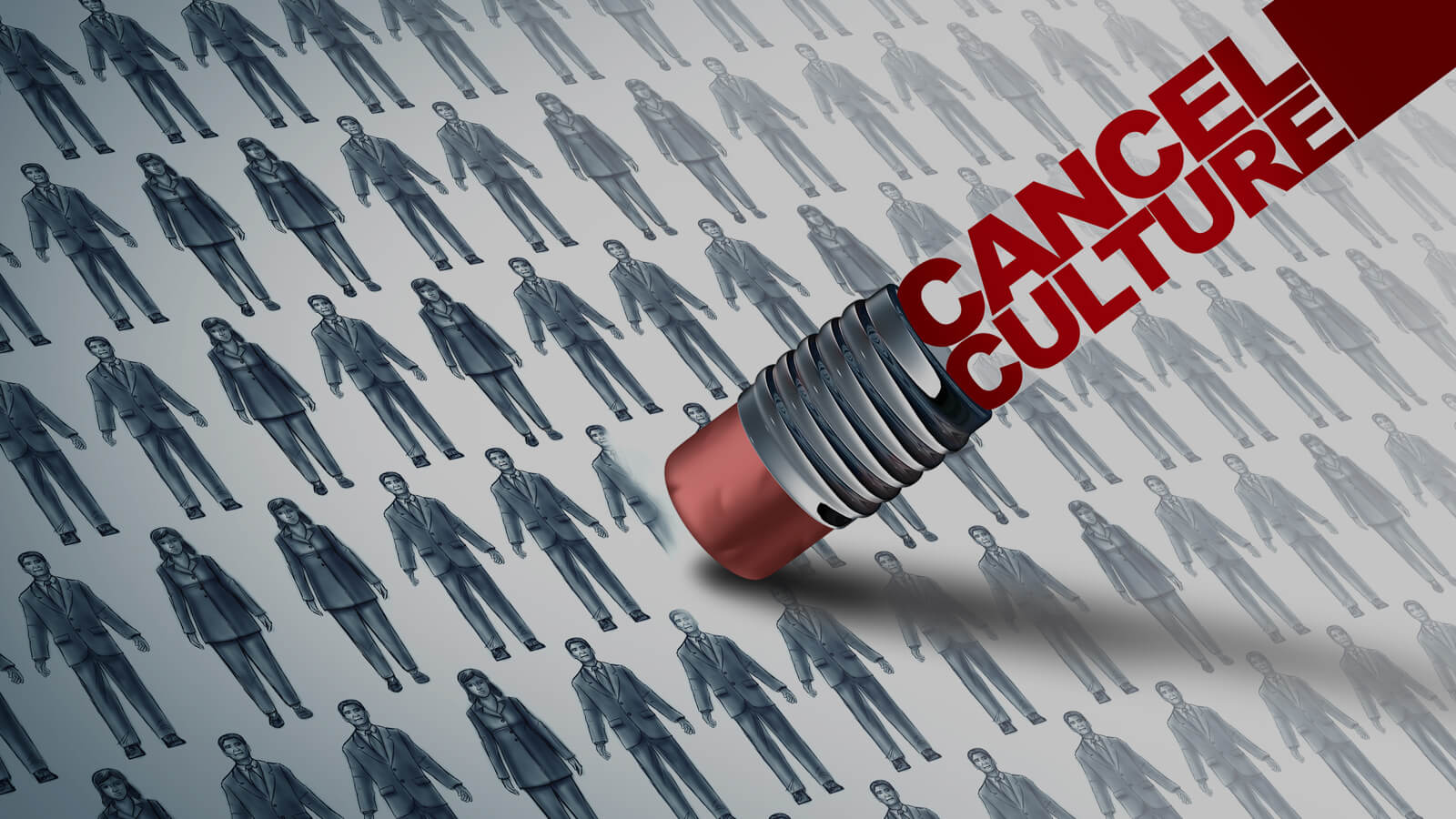Become a supporting member to watch the full conversation
Humanity is entering the Transformation Age, a new era of human civilization, with Integral Consciousness rising at its leading edge. Our members don’t use Integral Life as just another media subscription they use weekly or discard. Instead, most stay with us for years, using Integral Life to learn Integral Philosophy and build an integral mind slowly, methodically and when they need it. We’re here to help you shape the future that’s emerging no matter where your life takes you.
Get Full Access For $1 (7 days)*
Or explore all membership plans →
* Trial price for the first 7 days, then $20/month. Cancel or switch plans in 2 minutes at any time.
In this episode of Integral Justice Warrior, hosts Mark Fischler and Corey deVos are joined by Nadine Strossen, a renowned advocate for free speech and former president of the ACLU, to traverse the rich history and the evolving frontier of free speech — a legacy that reaches from the philosophical debates of ancient Greece to today’s postmodern social media platforms. Together, Nadine, Mark, and Corey illuminate the critical importance of free speech, celebrating it as a beacon of individual rights, a testament to the unyielding human pursuit of truth and self expression, and a crowning achievement of the rational Orange stage of individual and collective development.
Freedom of speech is not something to be taken for granted. It is, in fact, the cornerstone of democracy itself, and a principle that needs to be fought for and renewed with every new generation. As speech itself continues to evolve, so do the sorts of challenges that come along with it — and in today’s information age, those challenges have become as complicated and entrenched as ever:
- the propagation of hate speech, misinformation, and propaganda,
- “flooding the zone” with speech that normalizes extremist views and values,
- undermining trust in our academic, media, and political institutions,
- the paradox of tolerance and the delicate task of delineating the boundaries of acceptable discourse.
These issues require solutions that are at least as complex and nuanced as the problems themselves. To many, it seems that censorship represents a quick and easy way to cut through those challenges — but of course censorship typically gives rise to far more severe problems, stifling open dialogue and eroding the foundational principles that uphold democratic societies. Drawing from the profound insights in her book Hate: Why We Should Resist It With Free Speech, Not Censorship, Nadine Strossen articulates that the remedy to things like “hate speech” is not suppression, but instead fostering a richer, more inclusive discourse. She advocates for a greater embrace of free speech, seeing it as a pathway to understanding and social harmony.
We find ourselves at a pivotal juncture in history. In a world transformed by the digital revolution, offering unprecedented avenues for self-expression, there are more flavors and varieties of speech than ever before — and also more efforts to silence that speech. We can see this schism running throughout the American political landscape, where both major parties perceive themselves as the last guardians of free speech who are defending this sacred right from the opposing party, a testament to the deeply polarized nature of contemporary discourse.
The conversation deepens as Nadine, Mark, and Corey examine a number of landmark Supreme Court rulings, including Brandenburg versus Ohio, New York Times versus Sullivan, and Buckley v. Valeo, each a pillar supporting the intricate architecture of free speech in America. These cases beckon us to engage more profoundly with the nuances of free speech, urging a deeper understanding and commitment to this fundamental right.
This episode invites you on a journey of reflection, urging a renewed commitment to the principles of free speech — a commitment grounded in understanding, respect, and the unyielding belief in the transformative power of words. Tune in to be part of a conversation that spans centuries, yet is as relevant today as it was in the time of Socrates. We hope you enjoy.
Key Questions to Contemplate
- How do I react when I encounter speech that I find offensive or harmful? Do I believe in countering it with more speech to present a different perspective, or do I lean towards the desire for censorship?
- How can we foster a culture that embraces a richer, more inclusive discourse as opposed to suppressing hate speech through censorship? What are the long-term implications of choosing censorship as a solution to the problems associated with free speech?
- How can we address the underlying attitudes and behaviors that give rise to hate speech and misinformation without resorting to censorship?
- How do I navigate the complex landscape of American politics where both parties perceive themselves as defenders of free speech while accusing the other of being its greatest threat? How can I foster understanding and bridge divides in this polarized environment?
Text, images, and maps by Corey deVos
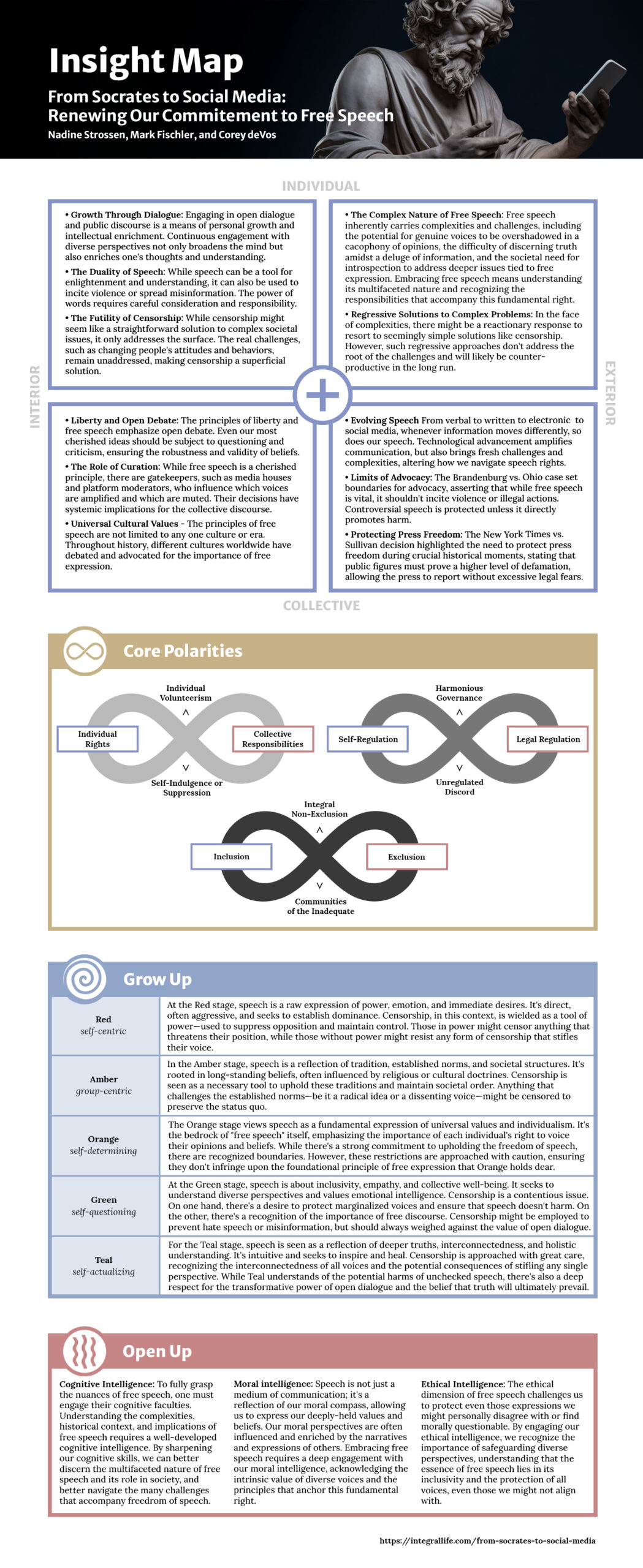
Related Polarities
Here are some of the most critical polarities to consider while listening to this broadcast.
In the dynamic interplay between individual rights and collective responsibilities, we find the heartbeat of a functioning society. This polarity encapsulates the tension between the autonomy of the individual and the needs and demands of the larger community. It is a dance of freedom and duty, where the rights to personal freedom, expression, and pursuit of happiness are constantly weighed against the collective responsibility to maintain harmony, safety, and wellbeing in the society.
Individual Rights stand as a testament to the value placed on personal freedom and self-determination. This pole emphasizes the right to autonomy, the freedom to express oneself, and the pursuit of personal happiness. It is the bedrock of democratic societies, fostering innovation, creativity, and personal development. However, an overemphasis on individual rights can lead to self-indulgence, where personal desires overshadow communal needs, potentially fostering inequality and discord.
Collective Responsibilities represent the obligations and duties we hold towards our community and society at large. This pole underscores the importance of working together, fostering a sense of belonging, and nurturing a community where everyone thrives. It promotes social harmony, mutual respect, and cooperation. Yet, an overemphasis on collective responsibilities can lead to suppression, stifling individual creativity and potentially leading to a loss of personal freedoms and autonomy.
-
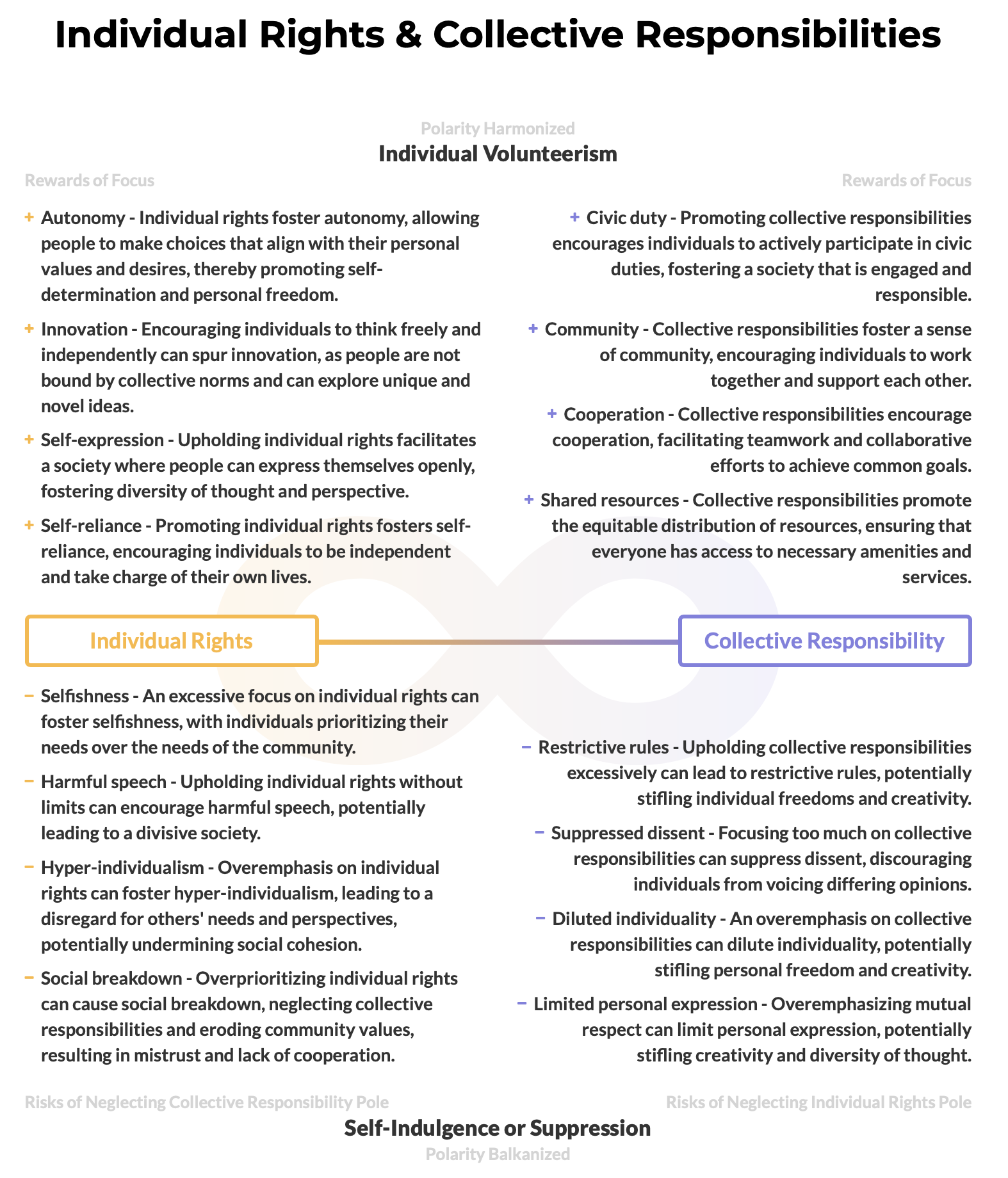
-
Integrated Polarity: Individual Volunteerism
Individual volunteerism represents a harmonious blend of individual rights and collective responsibilities. It encourages individuals to willingly and proactively contribute to the community, marrying personal freedoms with a deep sense of duty towards the collective. It fosters a society where individuals are not only focused on personal growth but are also committed to the wellbeing of the community, creating a vibrant, dynamic, and harmonious society.
Unintegrated Polarity: Self-Indulgence or Suppression
An unintegrated approach to this polarity manifests as either self-indulgence, where individual rights run rampant, disregarding the needs and wellbeing of the community, or suppression, where an overemphasis on collective responsibilities stifles individual freedoms and creativity. Both scenarios create a fractured society, marked by discord and a lack of cohesive community spirit.
Tips for integrating this polarity: To foster a society grounded in individual volunteerism, it is essential to cultivate a deep understanding and respect for both individual rights and collective responsibilities. This could involve educational initiatives that foster civic awareness and personal development, encouraging individuals to see the value in both personal autonomy and community engagement. It is about creating spaces where individuals can freely express themselves while also actively contributing to the community, fostering a society that is both vibrant and harmonious.
The tension between Self-Regulation and Legal Regulation captures a foundational dynamic in societal governance. On one hand, there’s the belief in the capacity of individuals or entities to govern their own actions responsibly, driven by intrinsic values and self-awareness. On the other, there’s the recognition of the need for an external legal framework to ensure consistency, protection, and order within a community or society.
Self-regulation emphasizes the power and responsibility of the individual in guiding their own actions and behaviors. It’s a “bottom-up” approach, where regulation starts at the individual level and extends outward to the collective. In this paradigm, individuals are trusted to make the right decisions for themselves and their communities, relying on personal judgment, ethics, and values. The belief is that when individuals are empowered to regulate themselves, they can collectively create a harmonious and well-functioning society.
Legal regulation represents the imposition of rules, standards, and guidelines from overarching authorities or governing bodies. It’s a “top-down” approach, where regulation is set at a higher, collective level and is then applied to individuals. This method seeks to create a standardized set of rules that everyone must follow, ensuring consistency and fairness across the board. It operates on the belief that for a society to function smoothly, there needs to be a clear set of guidelines that everyone adheres to, ensuring order and predictability.
-
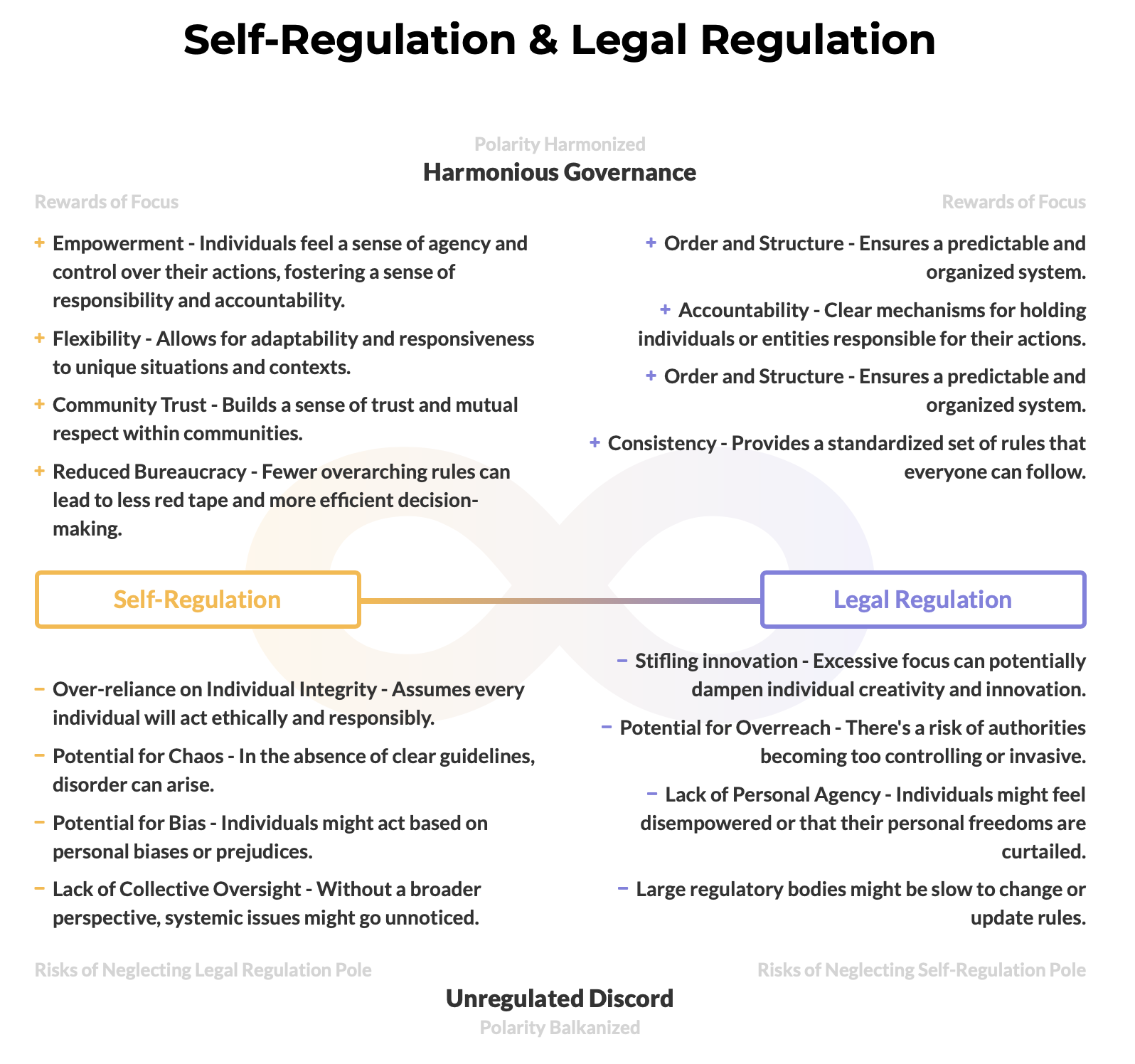
-
Integrated Polarity: Harmonious Governance
Harmonious Governance represents the optimal synergy between individual autonomy and societal oversight. It acknowledges the importance of personal freedom and self-regulation while recognizing the necessity of legal frameworks to ensure societal well-being. In this balanced state, individuals are empowered to act responsibly, and legal systems are designed to support, rather than suppress, these individual actions, leading to a society where freedom and order coexist seamlessly.
Disintegrated Polarity: Erratic Progress
Unregulated Discord arises when there’s an imbalance between self-regulation and legal regulation. It’s a state where individual freedoms, unchecked by personal responsibility, clash with overly rigid or inadequate legal systems. This discord results in a society marked by conflicts, mistrust, and inefficiencies, where neither individual aspirations nor collective goals are fully realized.
Tips for integrating this polarity: To navigate between Self Regulation and Legal Regulation, stakeholders must engage in continuous dialogue, fostering a culture of mutual respect and understanding. Regular reviews of legal frameworks, coupled with educational initiatives promoting responsible self-regulation, can help strike the right balance. By recognizing the value of both poles and actively working to integrate them, societies can move towards a state of Harmonious Governance, where individual freedoms are celebrated within a supportive and just legal framework.
The polarity between inclusion and exclusion is a central dynamic in the development and functioning of communities at the teal integral stage. It navigates the delicate balance between embracing a diversity of perspectives and maintaining a certain standard of discourse grounded in expertise and developmental adequacy. This polarity is pivotal in fostering environments that are both open and discerning, encouraging rich, multifaceted dialogues while preserving the integrity and depth of the discussions.
Inclusion stands for the acceptance and integration of a wide array of perspectives, valuing the richness brought in by varied backgrounds, developmental stages, and areas of expertise. It nurtures a sense of belonging, empathy, and collaboration, allowing communities to be dynamic and adaptive. Inclusion fosters environments where diversity is seen as a strength, promoting innovation and growth through a collaborative approach. However, it holds the risk of diluting the depth and quality of discourse if not paired with discernment.
Exclusion, on the other hand, underscores the necessity for discernment, boundaries, and standards in community dynamics. It safeguards the integrity and depth of a community by ensuring that the discourse maintains a high standard, grounded in relevance and informed perspectives. While it protects the community from potential dilution of purpose, it holds the risk of fostering isolation and a lack of diverse perspectives if taken to an extreme.
-
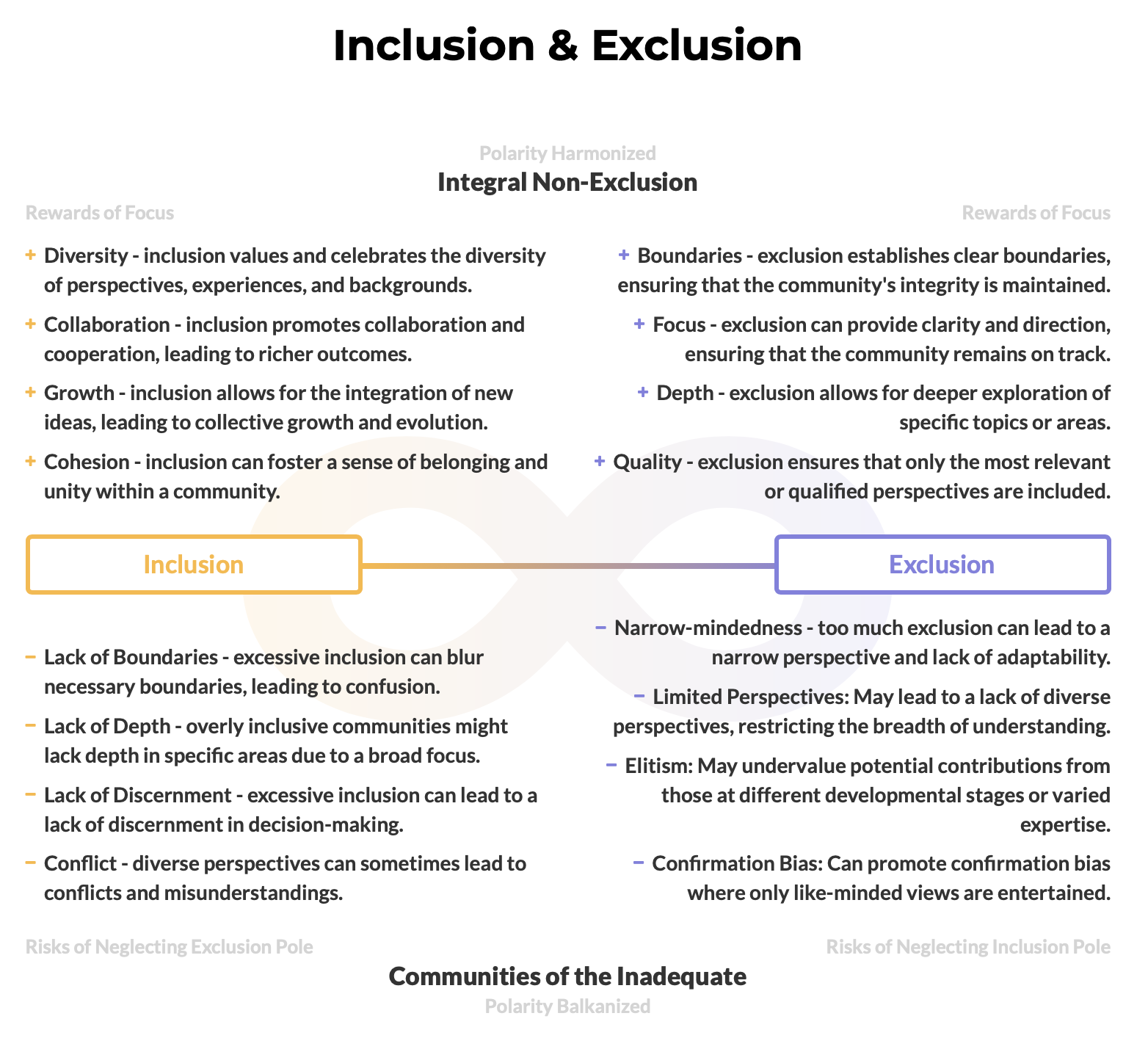
-
Integrated Polarity: Integral Non-Exclusion
Integral non-exclusion is one way of thinking about the integrated polarity, representing a sophisticated balance between inclusion and exclusion. Non-exclusion is another way of saying “everyone is right… but some are more right than others.” It embodies a holistic approach that encourages the inclusion of as many perspectives as possible, so long as they are not overly hostile to other perspectives. This approach fosters “communities of the adequate,” where individuals share similar levels of development, expertise, or qualification, promoting a rich and deep discourse while avoiding the pitfalls of overextension.
Disintegrated Polarity: Communities of the Inadequate
The unintegrated polarity manifests as “communities of the inadequate,” where there is a failure to balance the dynamics of inclusion and exclusion effectively. These communities may either stretch too wide, losing depth and focus, or become too narrow, stifling diversity and innovation. The inadequacy comes from not effectively navigating the tension between depth and span, leading to a limited, flatland perspective that doesn’t fully leverage the potential richness of a truly integral community.
Tips for integrating this polarity: To successfully integrate this polarity, it is essential to foster environments that encourage open dialogue while maintaining a respect for expertise and developmental adequacy. Communities should be encouraged to embrace diversity while also cultivating depth in discourse. Regular reflective practices can be instituted to ensure that the balance is maintained. Moreover, creating spaces for both confidential deep dives and broader, transparent discussions can aid in navigating the tension between depth and span, fostering a community that is both deeply connected and widely impactful.
Exclusive 30% discount off Nadine Strossen’s new book,
Free Speech: What Everyone Needs to Know
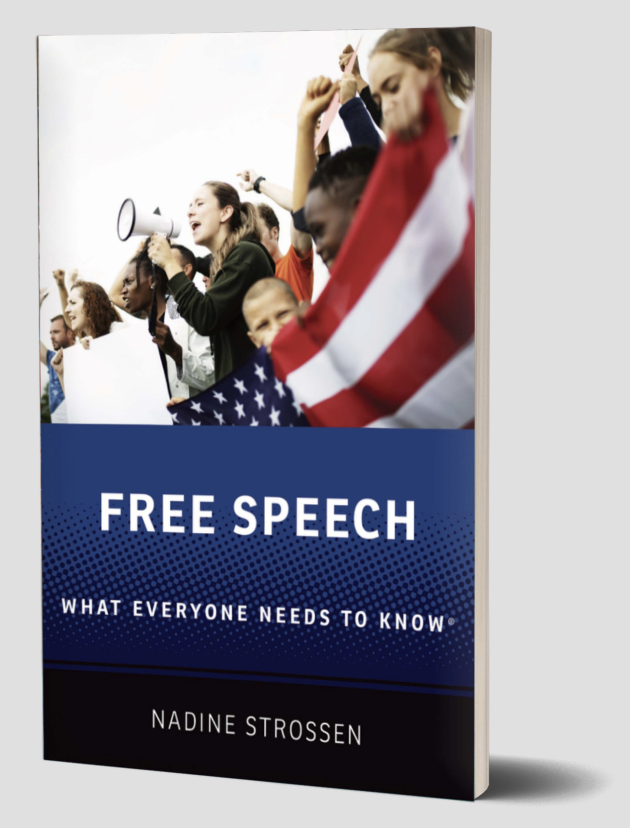 This concise but comprehensive book engagingly lays out specific answers to myriad topical questions about free speech law, and also general explanations of how and why the law distinguishes between protected and punishable speech. Free Speech provides the essential background for understanding and contributing to our burgeoning debates about whether to protect speech with various kinds of controversial content, such as hate speech and disinformation: the applicable legal tenets and the strongest arguments for and against them.
This concise but comprehensive book engagingly lays out specific answers to myriad topical questions about free speech law, and also general explanations of how and why the law distinguishes between protected and punishable speech. Free Speech provides the essential background for understanding and contributing to our burgeoning debates about whether to protect speech with various kinds of controversial content, such as hate speech and disinformation: the applicable legal tenets and the strongest arguments for and against them.
Click here to purchase.
Discount code: ALAUTHC4
The book focuses on modern First Amendment law, explaining the historic factors that propelled its evolution in a more speech-protective direction – in particular, the Civil Rights Movement. It highlights the many cases, involving multiple issues, in which robust speech-protective principles aided advocates of racial justice and other human rights causes. The book also shows how these holdings reflect universal, timeless values, which have been incorporated in many other legal systems, and have inspired countless thinkers and activists alike.
Previous Episodes of Integral Justice Warrior

Become a member to access the full episode
Start building your big picture mind & support the global emergence of Integral consciousness

“Integral Life is the most important and globally-relevant platform for the leading edge of Integral consciousness evolution”
– Eugene P.
Learn about our membership
Nadine Strossen, the John Marshall Harlan II Professor of Law Emerita at New York Law School and past President of the American Civil Liberties Union (1991-2008), is a Senior Fellow with FIRE (the Foundation for Individual Rights and Education) and a leading expert and frequent speaker/media commentator on constitutional law and civil liberties, who has testified before Congress on multiple occasions. She serves on the advisory boards of the ACLU, Academic Freedom Alliance, Heterodox Academy, National Coalition Against Censorship, and the University of Austin.
Mark Fischler is a Professor of Criminal justice and current program coordinator for the criminal justice and criminology programs at Plymouth State University. Prior to joining the Plymouth State faculty, he practiced law, representing poor criminal defendants for the New Hampshire Public Defender’s Office. Mark has worked extensively with alternative theoretical models in law, constitutional law, and higher education, and has published on integral applications to teaching, being a lawyer, and legal theory. His focus in the classroom is ethics and criminal procedure, and is well respected for a teaching philosophy that emphasizes recognizing the humanity and dignity of each student. Professor Fischler was awarded the outstanding teaching award at his university in 2014. He currently offers a weekly Spiritual Inquiry class through Satya Yoga Studio.
Corey W. deVos is editor and producer of Integral Life. He has worked for Integral Institute/Integal Life since Spring of 2003, and has been a student of integral theory and practice since 1996. Corey is also a professional woodworker, and many of his artworks can be found in his VisionLogix art gallery.
 This concise but comprehensive book engagingly lays out specific answers to myriad topical questions about free speech law, and also general explanations of how and why the law distinguishes between protected and punishable speech. Free Speech provides the essential background for understanding and contributing to our burgeoning debates about whether to protect speech with various kinds of controversial content, such as hate speech and disinformation: the applicable legal tenets and the strongest arguments for and against them.
This concise but comprehensive book engagingly lays out specific answers to myriad topical questions about free speech law, and also general explanations of how and why the law distinguishes between protected and punishable speech. Free Speech provides the essential background for understanding and contributing to our burgeoning debates about whether to protect speech with various kinds of controversial content, such as hate speech and disinformation: the applicable legal tenets and the strongest arguments for and against them.


